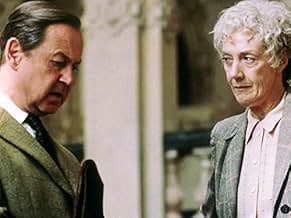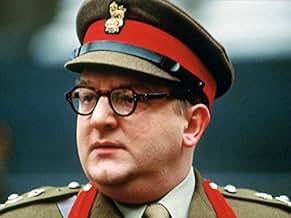Anthony Powell's twelve volume novel sequence "A Dance to the Music of Time" has been dramatized for television.Anthony Powell's twelve volume novel sequence "A Dance to the Music of Time" has been dramatized for television.Anthony Powell's twelve volume novel sequence "A Dance to the Music of Time" has been dramatized for television.
- Won 1 BAFTA Award
- 3 wins & 5 nominations total
Browse episodes
Featured reviews
Hands down, this is the best miniseries or film that I have ever seen. Everything about this miniseries was my cup of tea: the clothes, the scenery, the dialogue, the many handsome actors, just everything. I had broken down and bought myself one of those PAL video players as so many video tapes that I wanted to see were only available in PAL format. As an American NTSC videotape user, it was hard for me to reconcile the purchase of the special PAL VCR, until I saw this miniseries in all its glory. What an absolute confection! I wanted to be a part of the story. I find it hard to believe that this miniseries is not available to the American market in NTSC format. This miniseries far surpasses Brideshead Revisited, among others. Although Simon Russell Beal certainly did a phenomenal acting job, I also thought James Purefoy displayed alot of range and depth particularly in the difficult role of an observer narrator. I really can't say enough about how marvelous this miniseries was! It was worth every penny spent to see this miniseries!
A 1997 BBC adaptation of the seemingly endless cycle of novels by Anthony Powell. Essentially it is about a group of privileged, upper middle class literary types, who manage to coast through life without seeming to do very much at all, with a couple of notable exceptions. Despite this, it's totally compelling, particularly the episode that is set in World War Two.
Anthony Powell was well placed in the literary and party scene of the 1930s, and many of the characters are based on people he knew during his life and career, literary and military. The Anthony Powell Society has a fascinating page detailing the real life inspirations for many of his characters.
A degree of tolerance, along with a suspension of disbelief, is required to enjoy the final instalment, although it actually improves after the first viewing. The principal character Nick Jenkins (based on Powell himself) had hitherto been played by James Purefoy, but Jenkins was recast with John Standing for the final episode. This could be a little disconcerting at first, particularly as James Purefoy had created such a likeable character, and had anchored the narrative of the first three episodes. Some of the other essential characters - ones that weren't recast - tended to age at their own rate, regardless of the timeline. JG Quiggin (Adrian Scarborough) and Kenneth Widmerpool (Simon Russell Beale) seemed to age about half century in the decade or so after the war, whereas Pamela Flitton (Miranda Richardson) barely developed a grey hair. The makeup, now far more obvious with HD television, was not good at all, particularly on the standout character, Widmerpool, otherwise played superbly all the way through by Simon Russell Beale.
Despite these flaws in the final episode, this remains one of my favourite dramas of all time, largely because the actors bring the characters to life so beautifully.
Anthony Powell was well placed in the literary and party scene of the 1930s, and many of the characters are based on people he knew during his life and career, literary and military. The Anthony Powell Society has a fascinating page detailing the real life inspirations for many of his characters.
A degree of tolerance, along with a suspension of disbelief, is required to enjoy the final instalment, although it actually improves after the first viewing. The principal character Nick Jenkins (based on Powell himself) had hitherto been played by James Purefoy, but Jenkins was recast with John Standing for the final episode. This could be a little disconcerting at first, particularly as James Purefoy had created such a likeable character, and had anchored the narrative of the first three episodes. Some of the other essential characters - ones that weren't recast - tended to age at their own rate, regardless of the timeline. JG Quiggin (Adrian Scarborough) and Kenneth Widmerpool (Simon Russell Beale) seemed to age about half century in the decade or so after the war, whereas Pamela Flitton (Miranda Richardson) barely developed a grey hair. The makeup, now far more obvious with HD television, was not good at all, particularly on the standout character, Widmerpool, otherwise played superbly all the way through by Simon Russell Beale.
Despite these flaws in the final episode, this remains one of my favourite dramas of all time, largely because the actors bring the characters to life so beautifully.
Though nothing can compare with the books this is quite a fine stab, studded with the finest English talent of its period sensitively cast, and moderately faithful to significant portions of the books. The narrator's voice and perspective are well maintained though oddly James Purefoy is replaced by an excellent but jarring John Standing in the last episode while most of the other actors are cosmetically aged with varying degrees of success. Simon Russell Beale excels but does not dominate as the repulsive Widmerpool and the female characters live as they don't always in the books where they are seen through men's eyes. The music is well chosen and used from Coward's "Twentieth Century Blues" onwards and the use of visual art, including the eponymous Dance is apt.
They don't make adaptations like this any more - no doubt for cost reasons and a lack of imagination and bravery at the TV companies. 7 hours of solid drama, yet full of incidental humour and some very fine characterisations.
Unfortunately it is flawed, and the flaws make it just very good viewing rather than the excellent series it should have been. The biggest flaws to my mind are:
1 The decision to replace Nick and his wife by new actors for Film 4 was totally wrong. Nick ages far too much in too short a space of time, and looks completely different. This creates a real problem of believability.
2 Still on ageing, some of the actors are 'aged' very well, whilst others (especially the ladies and Odo) seem hardly any different as the decades progress.
3 Film 4 is by far the weakest, though to be fair this reflects the books on which it is based. Perhaps it should have been cut further and the earlier years given even greater prominence.
4 Despite a great deal of pruning, there are still too many characters and insufficient narration for non-aficionados of the books to be sure all the time of who is who.
5 The scenes often seem to be a succession of dramatic deaths - difficult to avoid with the way the story has to be condensed, but very predictable nonetheless.
However, it's still pretty good, and light years removed from much of the dumbed-down drama on TV today.
Unfortunately it is flawed, and the flaws make it just very good viewing rather than the excellent series it should have been. The biggest flaws to my mind are:
1 The decision to replace Nick and his wife by new actors for Film 4 was totally wrong. Nick ages far too much in too short a space of time, and looks completely different. This creates a real problem of believability.
2 Still on ageing, some of the actors are 'aged' very well, whilst others (especially the ladies and Odo) seem hardly any different as the decades progress.
3 Film 4 is by far the weakest, though to be fair this reflects the books on which it is based. Perhaps it should have been cut further and the earlier years given even greater prominence.
4 Despite a great deal of pruning, there are still too many characters and insufficient narration for non-aficionados of the books to be sure all the time of who is who.
5 The scenes often seem to be a succession of dramatic deaths - difficult to avoid with the way the story has to be condensed, but very predictable nonetheless.
However, it's still pretty good, and light years removed from much of the dumbed-down drama on TV today.
It's possibly a bit late to post this question but as I have only now managed to see the video, here goes anyway. Does anyone know WHY it was deemed necessary to replace James Purefoy and Emma Fielding as Nicholas Jenkins and his wife in the last film of the series? Most of the other characters were left to age, convincingly or otherwise, even Widmerpool himself. Though Joanna David did at least bear a tolerable resemblance to how Isobel (Fielding) might have looked in later life, John Standing, excellent actor though he is, didn't look remotely like an aged James Purefoy. The changeover broke the continuum of events for me and was a constant source of irritation. What was behind this strange, irrational decision?
Did you know
- GoofsIn the final segment, when Widmerpool is kissing the feet of the disciples, the edge of his phony hairpiece is clearly visible on the back of his head.
- How many seasons does A Dance to the Music of Time have?Powered by Alexa
Details
- Release date
- Country of origin
- Language
- Also known as
- Una danza para la música del tiempo
- Filming locations
- Production companies
- See more company credits at IMDbPro
Contribute to this page
Suggest an edit or add missing content











































